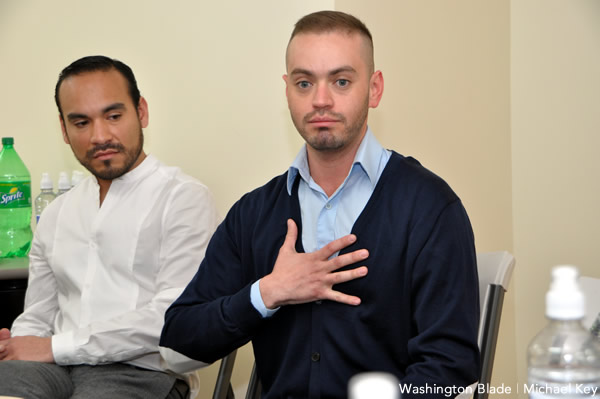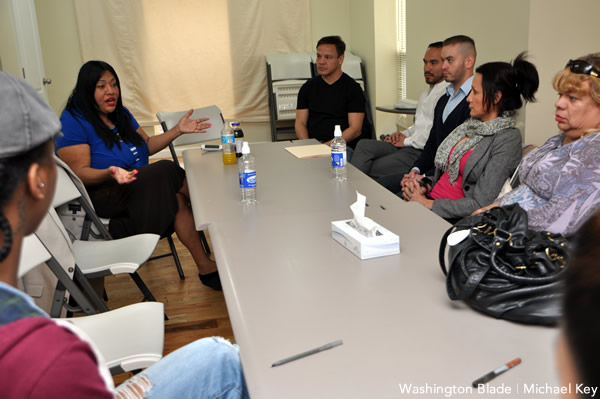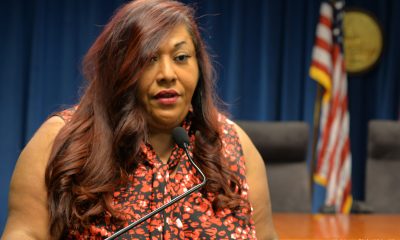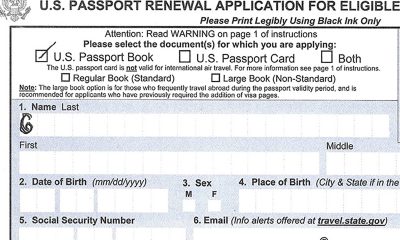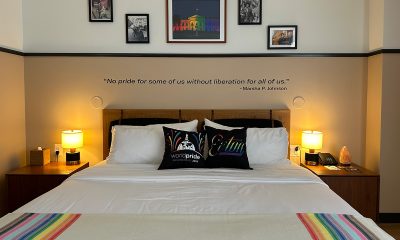Local
Casa Ruby seeks to expand jobs program
Dozens of clients attend employment classes, workshops each month
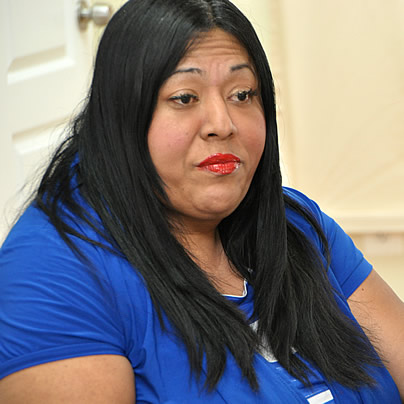
D.C. resident Lovely Allen worked at a local Safeway when she was a teenager, but she complained the supermarket’s managers did not provide her co-workers with any sensitivity training.
“They called me he and stuff like that,” Allen, 22, said while at Casa Ruby on Georgia Avenue in Northwest Washington on Monday. “It’s uncomfortable when you’re trying to work somewhere and someone’s referring to you as something that you don’t agree with and you don’t identify as.”
Allen is among the nearly dozen people enrolled in Casa Ruby’s job placement and training classes with whom the Washington Blade spoke on Monday.
The Latino LGBT community center offers a variety of vocational courses that include teaching clients how to become medical technicians who can administer HIV, hepatitis and glucose tests to patients.
Eduardo Carcamo works with Casa Ruby clients who want to become make-up artists, while designer Felix Montes has offered to instruct those interested in entering the fashion industry. Interior designer Enrique Coronado, who studied in Spain, also works with Casa Ruby clients.
The classes typically last two months, and participants receive a certificate from the instructor and from Casa Ruby upon completion.
More than 60 people graduated from the latest medical technician class that ended in December. A dozen clients attended Casa Ruby’s latest make-up artistry course, while roughly 30 participants take part in job consulting and skills development workshops each month.
Both Montes and Coronado reached out to Casa Ruby for job placement and other services before they offered to work with clients.
“It is an environment where people are welcome,” Casa Ruby CEO Ruby Corado said. “There are schools out there where unfortunately people don’t feel welcome.”
D.C. resident Ismael Delgado, who is originally from Paraguay, is among those who graduated from the make-up artistry class last December.
He told the Blade he wanted to enter cosmotology school, but could not afford the $25,000 tuition.
“They are very expensive,” Delgado said.
Teri Williams enrolled in Casa Ruby’s program after she received a referral through Project Empowerment, the city’s jobs training program for transgender Washingtonians.
“My education level is not really where it should be for my age because I was doing other things when I was coming up,” the D.C. resident who just turned 50 said. “The thing is now I need to be able to sustain my life and I need financial assistance, which I want to provide for myself. I honestly want to work.”
Montes, who is originally from Puerto Rico, said he is working with Casa Ruby because he wants to help other people find work who are unable to afford expensive job training courses.
“Everyone has talent,” he said. “Nobody can say that they do not have a talent. It is a question of what you’re looking for, what you like to do and your career will be what you want it to be.”
Statistics continue to show Latinos and other underrepresented groups within the LGBT community remain particularly vulnerable to employment discrimination.
A 2011 study from the National Center for Transgender Equality and the National Gay and Lesbian Task Force found trans people are nearly twice as likely to be unemployed than the general population. The jobless rate among trans people of color is four times higher than the national average.
The survey reported 97 percent of respondents experienced harassment or mistreatment while at work. Nearly half of them said a prospective employer did not hire them because they were transgender. And 26 percent of respondents indicated they lost their jobs because of their gender identity and expression.
NCTE and the Task Force further noted 15 percent of respondents earned less than $10,000 a year. This figure among blacks who took part in the survey jumped to 35 percent.
The D.C. Department of Employment Services in 2011 launched Project Empowerment as a way to help reduce unemployment and poverty rates among trans Washingtonians.
More than 70 people have graduated from the program since its inception, but those with whom the Blade spoke at Casa Ruby said city officials can do more to help trans people and D.C. residents who are looking for work.
“Project Empowerment needs to be a little longer,” Williams said. “Once you get used to working and you’re changing your ways, you’re right back out there if you don’t get your job right away.”
Allen said she had tried to enroll in Project Empowerment a couple of months ago, but she said it was full. She is scheduled to start with the program “in a few days” after she and Corado reached out to Mayor Vincent Gray.
“I do feel there’s a lack of jobs here for the gay and transgender people,” Allen said. “A lot of times I guess they [prospective employers] worry about how it makes their places look if you hire trans people or Latinas. If I can work then why shouldn’t I be able to?”
Casa Ruby has not received any grant money from the D.C. Department of Employment Services to fund the jobs program since it officially opened last June. Corado said she is planning to reach out to private donors, foundations, non-profit organizations and other groups that may want to invest in them.
Meanwhile, participants hope city officials work to address some of the underlying issues they maintain prevent LGBT Washingtonians from gaining employment.
“Here there is a lot of discrimination,” Coronado said. “I have a resume with my studies, with specific jobs but I have a Latino last name — not an American last name.”
He added the language barrier and a lack of knowledge of the benefits the city offers to those who are seeking employment and the rights they have as D.C residents are among the additional barriers.
Delgado said he would like to see the Gray administration do more to address these issues.
“We are preparing a group of people that will empower themselves, others,” Larry Villegas of Casa Ruby added as he discussed a previous jobs program for people with HIV/AIDS. Companies were able to call and look at resumes when they needed to hire someone. “We need to fill that gap from the officials to say OK we need to revamp that program that could hire anybody that is skilled.”
Allen and other Casa Ruby clients acknowledged it is their responsibility to take the initiative to find a job. They added discrimination and other barriers make this task exceedingly difficult.
“No one is going to go home and change from the woman that they are and put on a fitted hat and a pair of tennis shoes to get a job,” Allen said. “I don’t think anybody should have to do that. I don’t think you should have to alter your appearance or who you are to gain employment.”
District of Columbia
Ruby Corado sentencing postponed for third time
Attorneys say former Casa Ruby director has ‘significant medical issues’
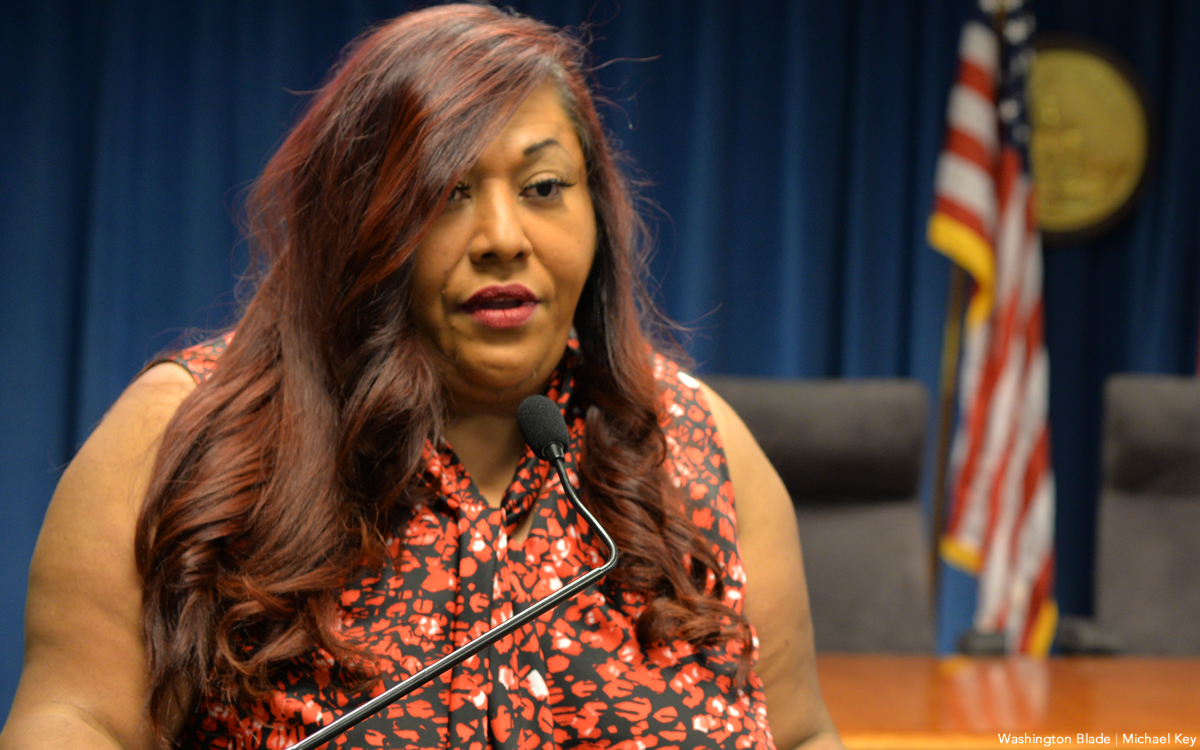
A federal judge on April 8 approved a request by defense attorneys to postpone the sentencing of Ruby Corado, the founder and executive director of the now closed D.C. LGBTQ community services organization Casa Ruby on a charge of wire fraud, from April 29 to July 29.
Court records show that Judge Trevor N. McFadden of the U.S. District Court for the District of Columbia approved a motion filed by Corado’s two defense attorneys on that same day calling for the sentencing postponement on grounds of health issues.
“Ms. Corado has significant medical issues,” the April 8 motion states. “She has an important medical appointment related to one of her diagnoses scheduled in June 2025 and will need time to recover from that appointment,” it says.
The motion gives no further details on Colorado’s medical issues. A.J. Kramer, director of the D.C. Office of the Federal Public Defender, whose attorneys are representing Corado, said the office has a policy of never disclosing specific medical related information regarding its clients.
Court records show that prosecutors with the Office of the U.S. Attorney for D.C. did not object to the defense motion seeking the third sentencing postponement.
The records show that an earlier postponement of the sentencing, from March 28 to April 29, was initiated by the judge due to a scheduling conflict. The first postponement from Jan. 10 to March 28 came at the request of Corado’s attorneys, court records show.
Corado pleaded guilty on July 17, 2024, to a single charge of wire fraud as part of a plea bargain deal offered by prosecutors. The charge to which she pleaded guilty says she allegedly diverted at least $150,000 “in taxpayer backed emergency COVID relief funds to private offshore bank accounts for her personal use,” according to a statement released by the U.S. Attorney’s office.
Prosecutors have said funds that Corado allegedly diverted for her own use were intended to be used by Casa Ruby in support of its various programs, including housing services for homeless LGBTQ youth and support for LGBTQ immigrants.
The U.S. Attorney’s statement also notes that in 2022, when “financial irregularities at Casa Ruby became public,” Corado sold her home in Prince George’s County, Md. and “fled to El Salvador.” It was at that time that Casa Ruby ceased its operations.
Court records show that FBI agents arrested Corado on March 5, 2024, at a hotel in Laurel, Md., shortly after she returned to the U.S. At the request of her attorney and against the wishes of prosecutors, another judge at that time agreed to release Corado into custody of her niece in Rockville, Md., under a home detention order.
The release order came seven days after Corado had been held in jail at the time of her arrest by the FBI.
Under the federal wire fraud law Corado could be sentenced to a possible maximum sentence of 30 years in prison, according to the U.S. Attorney’s statement. However, court observers have said that due to Corado’s decision to waive her right to a trial and plead guilty, prosecutors will likely ask the judge to hand down a lesser sentence than the maximum sentence.
The statement by prosecutors points out that Corado’s decision to plead guilty to the one charge came after she had been charged in a criminal complaint filed on March 1, 2024, with bank fraud, wire fraud, laundering of monetary instruments, monetary transactions in criminally derived proceeds, and failure to file a report of foreign bank accounts.
All those charges except for the wire fraud charge were dropped at the time of her guilty plea.
District of Columbia
A room with Pride: D.C.’s LGBTQ history finds a new home at the Eaton
New suites highlight city’s queer community

Blocks away from where Frank Kameny once organized the first pickets for gay rights in Washington, a new hotel suite invites guests to relax, recharge, and revel in the LGBTQ history of the city with the capital’s first-ever Pride-themed room at the Eaton Hotel.
From the walls covered in Washington Blade archival photos from the past 50 years, to a vinyl library that spans decades and genres of music celebrated by LGBTQ fans, and little affirmations written on the mirrors, it becomes clear as soon as you open the door that this room is one of a kind.
The Blade sat down with Nina Ligon, the director of culture for the Eaton, in the suite to discuss why the boutique hotel has chosen to debut a Pride-themed room and how their unique mission-driven hospitality is at the center of it all.
Starting with how the relationship between the Blade and Eaton came to be, Ligon explained that the collaboration with D.C.’s principal LGBTQ newspaper has been around longer than she has been with the hotel.
“The Blade has always been present,” Ligon said. “It’s one of the entities here in the city that’s just always been around. When I came into my position here at Eaton, Sheldon Scott — our original director of culture who helped open the hotel — already had a relationship with Stephen [Rutgers] and other members of the Washington Blade. Through that we have been able to establish a really strong relationship in the city.”
That relationship flourished after the boutique hotel, which sees itself as more than a hotel — but a cultural hub for those wishing to explore Washington — was nominated for the Best of LGBTQ DC Awards, given out and published by the Blade.

“Beginning in 2022 we were first voted for best LGBTQ hotel in the city by the Best of LGBTQ DC Awards,” she said. “In 2023 we fell off, but that’s all right. We did get Editor’s Choice in 2024, and we’re gonna make a comeback.”
That comeback, Ligon hopes, is aided by the addition of the new Capital Pride-themed hotel suite, which used feedback from LGBTQ hotel staff to determine what went in the room.
“It’s community. We have a really great team here at Eaton, so we were able to put together a committee with anyone who wanted to be involved and have some say. And that’s not just the pride suite specifically, but World Pride in general — in our pride efforts, 365, right throughout the year. A lot of these,” she said, pointing to the walls covered in framed photos taken from the Blade archive, “are ideas that came up during those early meetings just a few months ago. There were discussions of inflatable chairs and disco balls, and I was for it. I’m here to support their creative vision. And you know, we have to involve the corporate folks, and they’re a little more traditional than some of us. But the team really came together with some of the pieces and the timeline wall art that we’re working on.”
Ligon continued, explaining that special attention was given to ensure diverse LGBTQ experiences are represented in the room. From the pictures of LGBTQ icons like Marsha P. Johnson and RuPaul, to the music on their sound system (including Chappell Roan’s “The Rise and Fall of a Midwest Princess” and Troye Sivan’s “Bloom”), and the quotes on the walls, their goal was to uplift the whole LGBTQ community rather than one particular identity.
“My colleague, Eduardo [Romero], who’s been just a beam of light in my life, brought this to my attention. As a Black woman, I was reading through the Blade’s archive links and was sifting through some of those and he was like, ‘Okay, yeah, these look good, but there’s some people who are missing.’ Capital Pride has been traditionally cis, white male led. He helped me, as a Black woman, to step back and say. ‘Say, oh, wait, there’s more that we can be representing here. There are more people we could be representing.’ And so I reached out to DC Black Pride to see what image imagery they may have had and what input they had. And we were able to come up with a little something.”
As the tour of the room came to a close, Ligon told the Blade what she hopes people get from staying in this suite.
“When it comes to Pride, Pride is resistance,” she said. “Pride is more than just a party. Pride is an opportunity. It started with people who were fighting for their rights and their mere existence. And so I really want people, whether they come here to party or to take a load off, I really want them to take some time to reflect and see Pride for what it is, and that first being a form of resistance as we chart the course forward into a brighter future for the LGBTQ community and for all. None of us are free until we are all free. And I hope that this will be a reflection of that.”
The Eaton Hotel is at 1201 K St., N.W.
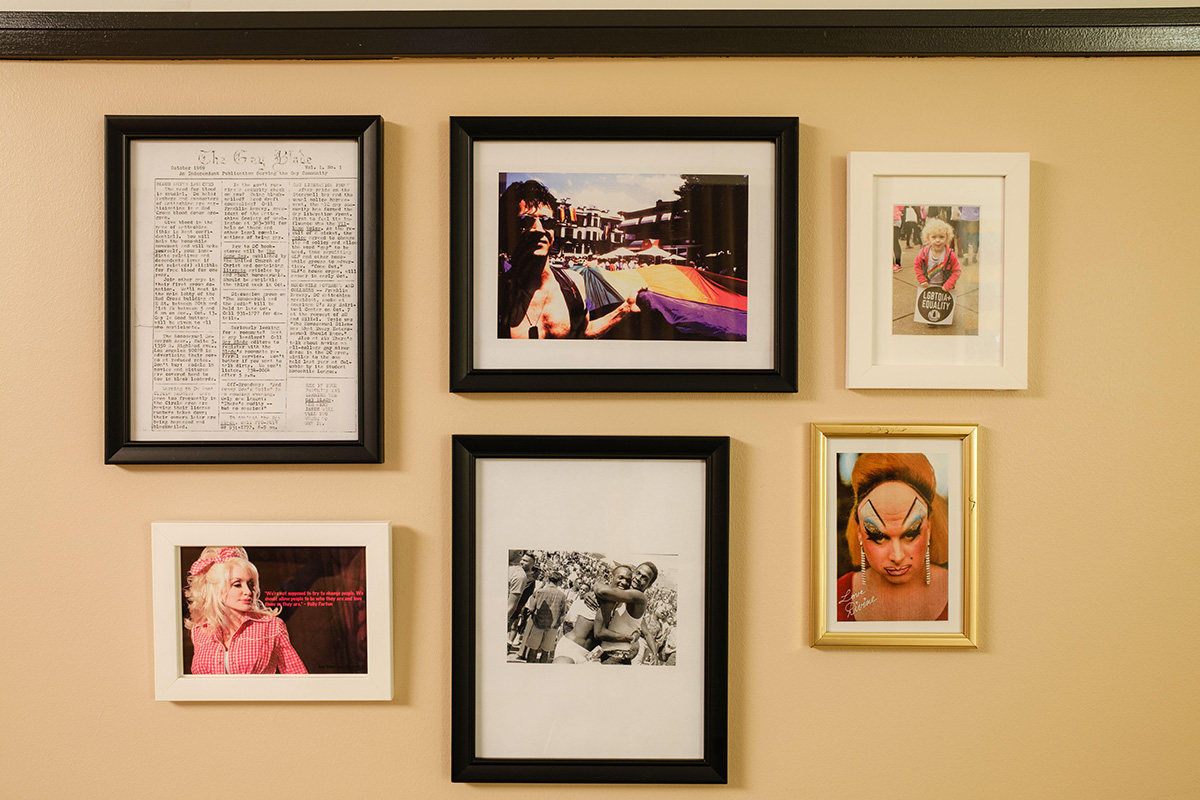
Opinions
We must show up to WorldPride 2025 in D.C.
Boycotts offer symbolic protest, but absence creates silence
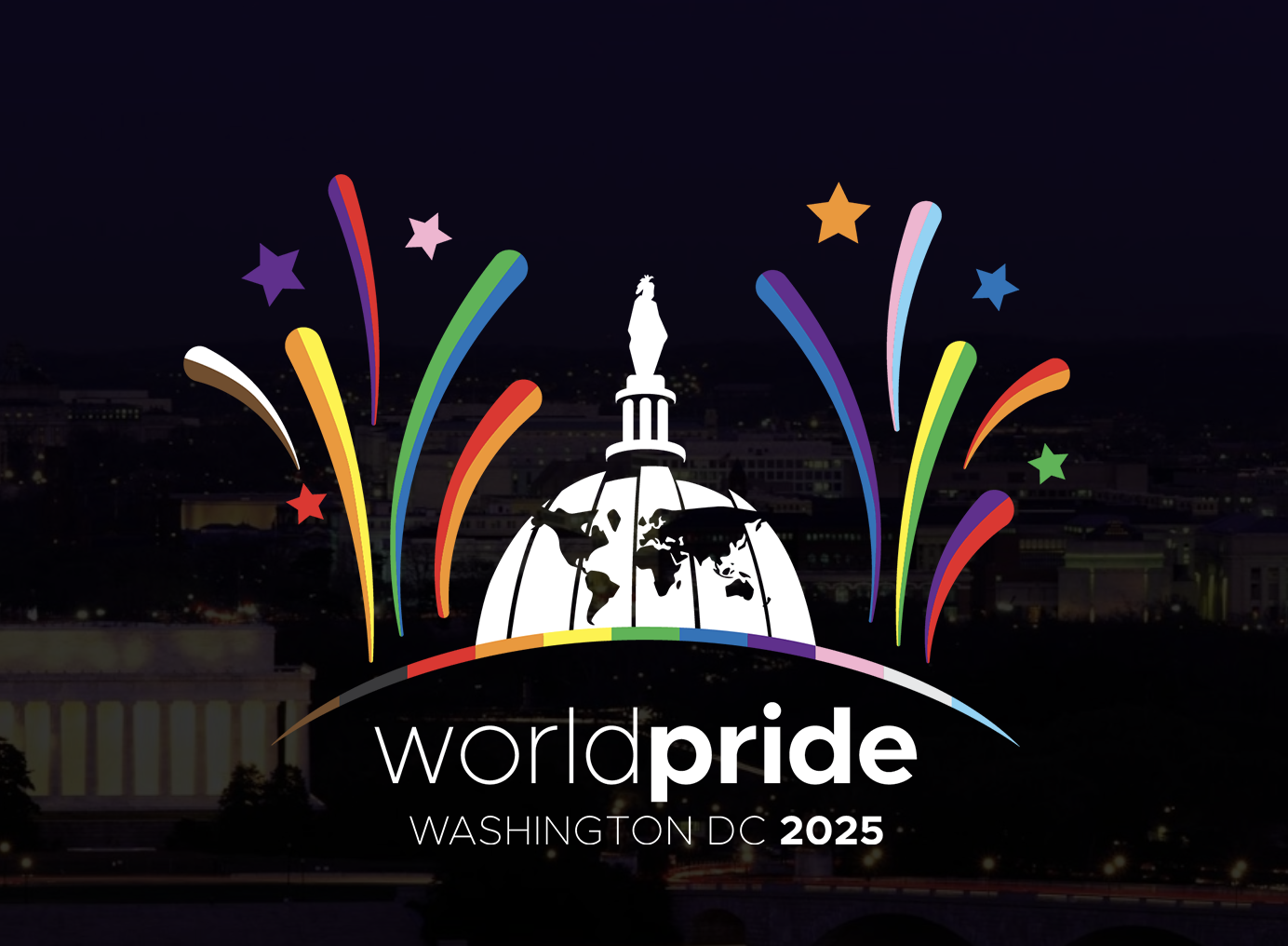
As an LGBTQI+ activist from Argentina, a country currently facing deep setbacks under an openly anti-rights government, I understand the frustration and fear many are expressing about attending WorldPride 2025 in the United States. I also understand the symbolic weight of showing up anyway.
Following the announcement by Egale Canada and the African Human Rights Coalition that they are withdrawing support for WorldPride due to the Trump administration’s anti-LGBTQI+ stance, concerns have rightly been raised about safety, complicity, and principle. These concerns must not be dismissed. But they must be responded to with a deeper strategic reflection: Visibility, presence, and collective action remain our greatest tools in confronting oppression.
Boycotts may offer symbolic protest, but absence creates silence
WorldPride is not organized by the U.S. government. It is a platform created by and for LGBTQI+ civil society — local activists, grassroots groups, trans-led collectives, BIPOC-led organizations, and everyday people building community despite hostile political environments. Boycotting this space sends a message not only to the Trump administration, but to our own movement: That when things get hard, we retreat.
History teaches us otherwise.
In 1990, amid the AIDS crisis and government neglect, activists did not boycott — they stormed the National Institutes of Health and the FDA. In 2014, when Russia passed its “gay propaganda” law, global solidarity at the Sochi Olympics became a powerful moment of protest and resistance. And in 2020, amidst a pandemic and police violence, Pride went digital but never disappeared.
If we set the precedent that global LGBTQI+ events cannot happen under right-wing or anti-LGBTQI+ governments, we will effectively disqualify a growing list of countries from hosting. That includes not only the U.S. under Trump, but Hungary, Italy, Uganda, Poland — and even my own country, Argentina, under Javier Milei. Yet ILGA World still plans to convene its 2027 conference in Buenos Aires, and rightly so. We must not surrender global platforms to the very governments that wish to erase us.
WorldPride is not a reward for good governance. It’s a tool of resistance
To those who say attending WorldPride in D.C. normalizes Trump’s policies, I say: What greater statement than queer, trans, intersex, and nonbinary people from around the world gathering defiantly in his capital? What more powerful declaration than standing visible where he would rather we vanish?
Safety is paramount, and all governments — including the U.S. — must guarantee the protection of LGBTQI+ participants. But refusing to engage is not the answer. In fact, visibility in hostile spaces has always been a hallmark of our movement’s strength. We showed up at Stonewall. We marched on Washington in 1979. We protested during the AIDS crisis, and we will show up again now — not in spite of adversity, but because of it.
We are in a global moment of rollback. Division is what our opponents want
The rise of anti-gender ideology and trans-exclusionary narratives has created fertile ground for far-right movements worldwide. In this moment, LGBTQI+ solidarity must be global, intersectional, and uncompromising. We cannot afford to fracture our own movement based on geopolitical fault lines.
Egale Canada and the African Human Rights Coalition raised legitimate criticisms — of U.S. foreign policy, immigration barriers, and systemic racism. But those issues must be confronted within WorldPride, not from outside it. We must bring those critiques into plenaries, panels, and the streets of Washington. We must create space for diasporic, racialized, and grassroots-led voices. We must use this moment to hold institutions accountable and shift the power of Pride to those most affected.
Because that is what solidarity looks like — not abandonment, but engagement.
WorldPride 2025 must not be a party disconnected from reality. It must be a protest rooted in our global truths.
Let us not cede this space. Let us make it ours.
Mariano Ruiz is the president of Derechos Humanos y Diversidad Asociación Civil in Argentina. He is also a 2019 Columbia HRAP Alumni.
-

 Virginia3 days ago
Virginia3 days agoYoungkin calls on gay Va. GOP LG candidate to exit race over alleged ‘porn’ scandal
-

 Commentary5 days ago
Commentary5 days agoA conversation about queers and class
-

 Kenya5 days ago
Kenya5 days agoKenya Red Cross-owned hotel to host anti-LGBTQ conference
-

 Opinions4 days ago
Opinions4 days agoNavigating employer-sponsored health insurance, care

